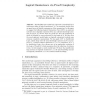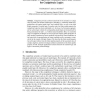148 search results - page 3 / 30 » On the Complexity of Elementary Modal Logics |
CSL
2006
Springer
13 years 11 months ago
2006
Springer
The Hintikka-style modal logic approach to knowledge has a well-known defect of logical omniscience, i.e., an unrealistic feature that an agent knows all logical consequences of he...
FOSSACS
2008
Springer
13 years 9 months ago
2008
Springer
Coalgebras provide a uniform framework for the semantics of a large class of (mostly non-normal) modal logics, including e.g. monotone modal logic, probabilistic and graded modal l...
POPL
2000
ACM
13 years 11 months ago
2000
ACM
In 1998 Asperti and Mairson proved that the cost of reducing a lambda-term using an optimal lambda-reducer (a la L´evy) cannot be bound by any elementary function in the number o...
CORR
2004
Springer
13 years 7 months ago
2004
Springer
We give a new type inference algorithm for typing lambda-terms in Elementary Affine Logic (EAL), which is motivated by applications to complexity and optimal reduction. Following p...
APAL
2010
13 years 7 months ago
2010
A well-known polymodal provability logic GLP is complete w.r.t. the arithmetical semantics where modalities correspond to reflection principles of restricted logical complexity in...


